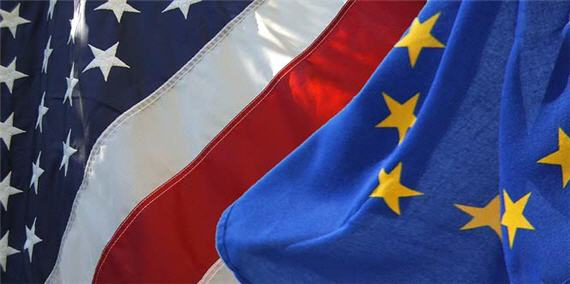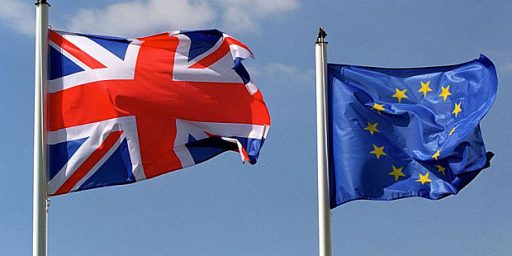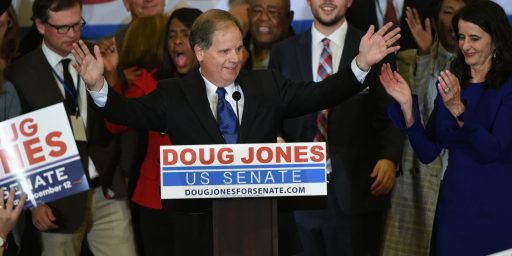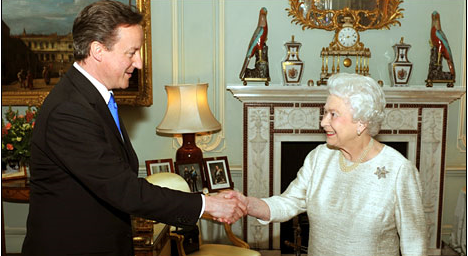Barriers to US-Europe Trade Deal Remain
A US-EU free trade zone is a no-brainer. But the devil is in the details.
A free trade zone between the United States and the European Union is a no-brainer. But the devil is in the details.
The Independent (“David Cameron’s trade deal with America outrages critics“):
The free-trade agreement with the US that David Cameron has spearheaded at the European Union is expected to be widely condemned this week as bad for workers’ rights and the environment. The deal opens trade between the US and the EU to an unprecedented level and threatens to do away with swaths of local regulations on businesses. Barack Obama, Mr Cameron and European ministers say removing such “barriers” will create jobs and boost the economies of both trading blocs.
The EU says the Transatlantic Trade and Investment Partnership deal (TTIP) could increase the region’s GDP by 0.5 per cent by 2027 and create more than two million European jobs.
The Prime Minister championed the deal during his presidency of the G8 last year. The Department of Business, Innovation and Skills estimates that long-term it could raise UK national income by between £4bn and £10bn a year.
But critics say it will drive down European standards of wages and employment rights to US levels and erode environmental standards.
The American economy is easily the world’s largest and American productivity is among the highest in the world. It’s rather embarrassing that the concern about a free trade deal reducing the living standard to the lowest common denominator is coming from the Europeans, not us. And yet the floor for individual workers is much higher across Europe.
Activists are especially concerned by proposals to allow multinationals to sue countries in international arbitration courts, bypassing the laws and policies of democratically elected governments. The provision enabling them to do this is known as the investor state dispute mechanism. The negotiators pour scorn on such talk, accusing the activists of scaremongering.
Before the next round of TTIP talks in Brussels next week, War on Want is launching its “National Anti-TTIP tour”. Speakers from the US and Germany will team up with unions including the NUT, Unison and Unite and representatives from other countries opposed to the plan. A demonstration on Saturday will include a march starting at the Department of Business in London.
Unite is pressing Mr Cameron to secure an exemption for the NHS. The union fears future governments will be blocked from renationalising privatised healthcare services because US multinationals could sue for jeopardising future profits.
The United States Senate, which has to ratify treaties, has historically balked at these sort of provisions, fearing loss of American sovereignty. But here the shoe is on the other foot. Whatever one’s view of the degree healthcare should be government run or privatized, it’s hard to argue that that decision ought be made by judges rather than national legislatures.
Polly Jones of the World Development Movement, which is also stepping up its campaign against TTIP, said: “We’ve had some successes in the past blocking these enormous multilateral deals. Many developing countries don’t like them. They don’t feel it’s fair that they should be pushed around by rich countries. The EU and US are responsible for half the world’s trade and a third of all GDP. This will be a very dominant bloc and the smaller countries outside fear it.”
Yeah, well, too bad. While there are clearly major details to be worked out, reducing trade barriers among the world’s wealthy democracies should have been done long ago. That doesn’t preclude bilateral or multilateral deals with less developed countries, such as the United States and Canada bringing Mexico into their free trade zone two decades ago.
It’s this sort of thing that’s more worrisome:
Many groups are concerned about the proposed courts to settle investor state disputes. Ms Jones cited “chilling” cases brought under similar agreements. In one such case, a French utility group sued Egypt for raising the minimum wage; in another the US tobacco giant Philip Morris sued Australia for introducing plain cigarette packaging.
Again, outside actors shouldn’t be able to sue against practices clearly designed to promote the health and welfare of the local citizenry, so long as the laws are uniformly applied rather than a disguised attempt to advantage domestic industry. That line, of course, is not always clear:
Other claimed threats include the adoption of less stringent food rules from the US which allow the sale of hormone-treated beef and pork. These are banned in the UK.
These issues are always contentious. Localities often hang on to outmoded practices, ostensibly out of misplaced health concerns. At what point does that become simple protectionism? Europe was well ahead of the United States in recognizing the benefits of food irradiation, which not only vastly increases shelf life and prevents the growth of harmful bacteria but also kills pests. The US banned the import of irradiated foodstuffs long after it became clear that the practice was beneficial, relenting only about a decade ago.
These sort of questions make both the negotiation and ratification of omnibus trade bills exceedingly difficult. The fact that the EU has the ability to negotiate for 28 member states on these matters does help enormously, however. It would be next to impossible to work out such a deal with that many countries on a multilateral basis.







Dr. Joyner,
Very little of ths agreement deals with trade liberalization. It is overwhelmingly devoted to what Bill Black has termed the Three De’s: de-regulation,de-supervision and de-criminalizarion of financial activities by large banks and devoted to protection of corporate profits from the laws of sovereign governments. There is no support for the claim this will create millions of jobs, and even if it were miraculously to boost GDP by .5% (it won’t but will cause GDP to contract as financial flows are diverted from productive investment to speculative and fraudulent activity) how will that be of benefit to society when virtually all of it is retained among the investors and financial institutions?
The best summary of this agreement as well as TISA and the TPP is: more freedom for those at the top and less for everyone else.
@Ben Johannson: Agreed. Nobody in Europe wants to live to our low standards.
A free trade agreement can be written on the back of a napkin. The present draft agreement runs to 45 pages, remarkably short for such a pact. That still suggests it has less to do with free trade than the terms under which trade will be managed, i.e. who will win and who will lose.
@Ben Johannson: @Dave Schuler: Free trade agreements and post-WTO trade negotiations have increasingly been about the terms of trade rather than trade itself. The low-hanging fruit was taken care of under the original GATT and subsequent rounds. Now, we’re on much more complicated issues like labor standards and the various non-tariff barriers that greatly impact trade but aren’t themselves trade.
That doesn’t preclude bilateral or multilateral deals with less developed countries, such as the United States and Canada bringing Mexico into their free trade zone two decades ago.
And how did that turn out for American workers again?
If anyone would like another view of how this treaty is being negotiated and its impact, please feel free. Oh, by the way, if you have to ask, “who benefits?” – it usually means, it won’t be you.
http://www.nakedcapitalism.com/2014/06/trade-treaties-coming-rule-global-corporatocracy.html
http://www.nakedcapitalism.com/2014/06/wikileaks-exposes-super-secret-regulation-gutting-financial-services-pact.html
@edmondo: According to a recent Council on Foreign Relations report, the results have been pretty modest on that front:
This is pretty much what I was arguing at the time of the Al Gore-Ross Perot debate on Larry King. All the effects that Perot and other anti-NAFTA critics could point to were already well underway.
With these trade agreements and treaties, one had better read the fine print. Decades ago, we watched as many industries in the US went out, victims to one sided trade deals. Many towns around here have huge empty buildings that used to be thread, hosiery, and spinning mills. Many were torn down over the years, even some that had been there since the 1800’s. Few indust+ries moved in. The only use of these facilities has been the occasional indoor flea market: shameful that these once great buildings have deteriorated so badly.
There was the “Buy American”, “USA 1” campaigns, but it was too little, too late. I used to look for “made in USA” labels, but gave up.
Think about it: $30-$40 for a sweatshirt that is made of about $3 worth of materials. Who gets the rest of that money?
@Tyrell:
What kind of business would you want that exist solely to sell to the domestic market and whose only real advantage is that it is protect by a high tariff. Also, what would you say to the employees at Boeing or Caterpillar who would have probably lost their jobs due to retaliatory tariffs. Protectionism is just another way for the government to pick the winners and loses.